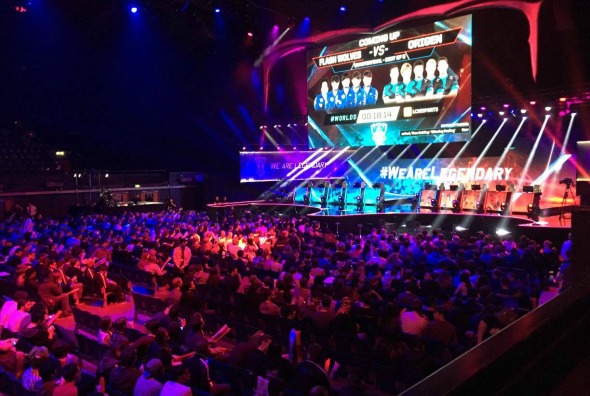eSports: What is it and what do you need to know?
October 12, 2016
eSports is a growing phenomenon that sees players – or teams – pitted against one another in competitive video game tournaments.
The bigger tournaments feature hundreds of thousands of pounds in prizes, with the biggest prized competition – the Dota 2 International – boasting a whopping $20m pot this year.
The best players are often picked up by eSports organisations and become professional gamers. They can earn a salary, take a share of winnings and sign lucrative sponsorship deals.
It’s not just the players. The eSports infrastructure has created jobs and roles in other areas, from casters (commentators) to journalists, admins/referees, broadcasters/hosts, team managers, coaches and more.
eSports differs greatly to other traditional sports (aside from the lack of physical activity) because there are many different games within it. For example, Counter-Strike: Global Offensive is a first-person team-based shooter where teams of five must take out the other team within a team limit (while attempting to plant/defuse a bomb), whereas Street Fighter V is a one-on-one 2D fighting game.
Then there’s League of Legends and Dota 2, multiplay online battle arena (MOBA) games which pit two teams of five against one another. Each player controls a character from an isometric viewpoint. They can level up and buy new items to improve their character as they attempt to destroy the enemy team’s base. That’s just to name a few games (some of which are on PC, while others are on consoles).
eSports has grown hugely in recent years. The number of consumers worldwide that are aware of eSports will surpass one billion this year, up 36% year-on-year, according to NewZoo.
The analyst also predicts that eSports will generate revenues of almost $500m this year, up 7% from the initial projection from the start of 2016.
In terms of popular competitions, the most-watched eSports tournament final was that of the 2015 League of Legends World Championship, which was viewed by 36 million people. Over the course of all 73 games, the tournament saw an average concurrent viewership of over 4.2 million, with the average fan watching for over an hour per viewing session.
Most of the bigger and established tournaments are broadcast on online streaming platforms such as Twitch, which allows users to view matches (or their favourite players) live and share their comments at the same time. Twitch pulls in almost 10m viewers every single day.
Taking these figures and the revenue opportunities into consideration, it’s no surprise to see eSports attract big brands, sponsors and investors.

The likes of Coca Cola, Betway, Intel, Mountain Dew, Alienware and many others have embraced the scene in recent years, investing in eSports teams, tournaments, players and more.
Traditional sports are also taking note of eSports. NBA basketball team the Philadelphia 76ers has just acquired UK-based eSports organisation Team Dignitas, while retired basketball pro Shaquille O’Neal invested in NRG eSports, to name a few.
Looking towards football, big established clubs are getting involved too. Bundesliga side Schalke 04 bought a League of Legends team earlier this year, while Premier League sides West Ham United and Manchester City have signed FIFA professional gamers. Other teams including Ajax, PSV Eindhoven, Wolfsburg, Valencia and others have announced their own eSports players.
Tournament operators such as ESL and Gfinity are growing, creating jobs within eSports and hosting various online and live LAN tournaments every year.
Two key areas of focus within the eSports industry this year have been regulation and player representation. At the moment, game developers set the rules, punishments and guidelines for their specific eSports games
Some organisations have emerged, such as the World eSports Association (WESA), which is backed by tournament provider ESL, but this currently regulates one league – the ESL CSGO Pro League. ESL has also begun drug testing in some of its major tournaments. Others like the eSports Integrity Coalition (ESIC) are taking steps to ensure integrity within eSports and prevent cheating.
There are also bodies forming around the world. The British eSports Association hopes to create future British champions, to support and promote the grassroots eSports scene in the UK, and help increase the awareness of eSports, for example.
Overall, eSports has made a huge impact in recent years. Whether it’s technically considered a sport or not doesn’t really matter. It’s eSports, it’s here – and it’s going to continue to grow.
iSportconnect is hosting an eSports Masterclass on 22nd November, click HERE for more details.


